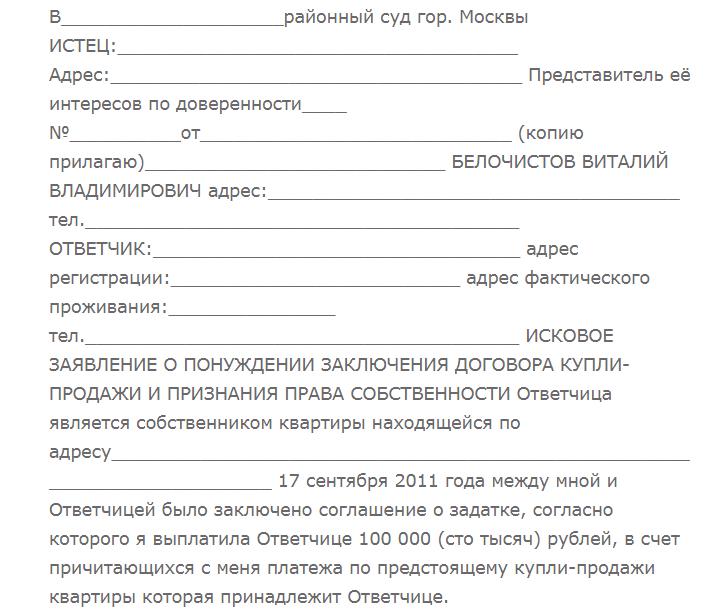Compulsion to conclude a contract is a way of protecting the rights of interested parties whose interests are violated by their counterparties. The law provides freedom of contract, but it should not violate other people's rights and interests. Consider the feature of the claim and its content.
Freedom of contract
The law prohibits anyone from forcing a transaction; you cannot use violence or other illegal methods. If this happens, there are grounds for contacting law enforcement agencies.

The law gives the right to interested parties to appeal to the court for coercion to conclude a contract. The grounds are regulations or previously concluded transactions, for example, a preliminary contract.
Conclusion procedure
Companies or entrepreneurs providing relevant services suggest signing an agreement directing the project. The second side is to sign it or send a response letter with comments on the conditions. Existing comments are recorded in the protocol of disagreements.
If they are absent, the document is signed and returned with the signature.
The total period for responding to a proposal is 30 days; other options are proposed by legislative acts.
Is writing required?
Transactions that exceed a certain price threshold are executed in writing - the law requires the terms to be written on paper.

The Civil Code also assumes that the party that has committed to accept the service or product agreed to the contract, which means that it fully lays down the rights and obligations. But filing in the future an application for coercion to conclude a contract is not excluded.
Typical cases
Public contracts. The entrepreneur or organization undertakes to conclude an agreement at the request of the consumer. The right to refuse arises only if it is impossible to provide a service or product. If there is evasion or refusal to sign the contract, the right arises to appeal to a judge.

The preliminary contract obliges the parties in the future to complete the transaction on pre-agreed conditions. The validity of such an agreement is limited to one year. The parties are entitled to refuse it by mutual agreement. It is not necessary that it is based on regulations.
The number of claims for coercion to conclude an agreement is increasing, in which the state becomes the defendant. Examples are the refusal of privatization, the signing of a social contract of employment, the signing of a custody agreement, etc.
Who is entitled to apply
The law does not restrict the right to appeal to the court the other side of the relationship. Entrepreneurs and organizations have the same right to sue. The condition of the appeal is a violation of the rights and interests of the plaintiff, as well as third parties.

If the entrepreneur is obliged to enter into a transaction, but the consumer does not have such an obligation, the consumer has the right to appeal to the court. For commercial organizations and entrepreneurs, this right does not arise in this case.
Preparing for a lawsuit
The judge, considering the statement of claim, its compliance with the law, finds out whether there have been attempts to resolve the issue peacefully, without his participation. Whether a draft contract or request was sent to the other party.
The use of the finished project in the relations between the parties is applied in the relations between commercial structures or entrepreneurs. It is enough for citizens to present evidence of a statement or request. Without this, coercion to conclude a contract in court is impossible.
The judge, having no evidence of communication between the plaintiff and the defendant, will not accept the claim or refuse it.
Features of the pre-trial procedure
In one of the court cases, the court concluded that the plaintiff did not take all measures to discuss the possibility of concluding such an agreement. Such an approach excludes a purely formal approach in relations with a potential partner.

The parties to the preliminary agreement have the right to apply to the court if a draft agreement has been submitted within the framework of the main agreement.
Which court to apply to
Economic disputes are considered in arbitration courts, civil cases involving ordinary citizens - in district or world courts at the place of residence or location of the defendant. Upon reaching the amount of half-year payments in the civil case of the mark of 50 thousand rubles. a claim for coercion to conclude a contract shall be submitted to the district court.
A bit about the timing
The peculiarity of such processes at the time of the emergence of judicial protection. Until the time allotted for the answer has expired, the plaintiff does not formally have any rights. If the proposal was sent by letter, mail, you should wait until the service issues the paper to the sender.
Application Features
Be sure to specify:
- name of court;
- information about the plaintiff (full name, patronymic or name of organization according to constituent documents);
- information about the defendant (full name, patronymic or name of organization according to constituent documents);
- circumstances of the case;
- request to oblige to conclude an agreement;
- list of attached documents;
- applicant's signature and filing date.
Describing the circumstances of the case, the plaintiff is obliged to justify his right to demand the conclusion of a contract by reference to regulations or previously reached agreements. How to prove it is described above.

The claim for coercion to conclude the contract is executed in several copies - one for the court, the second for the defendant.
National tax
A citizen will pay 300 rubles for the consideration of the claim, the organization - 6,000 rubles. in a district or magistrate court. In an arbitration court, a lawsuit for citizens and for organizations will cost 6,000 rubles.
There is a debate about whether to consider such claims property or not. It depends on the answer to calculate the amount of the fee based on the price of the object or payments, or pay it at a fixed rate.
Features of disputes in real estate transactions
The compulsion to conclude a contract of sale is made if previously there were properly executed arrangements.
Another option is an indication in regulations, for example, the sale of electricity.
The claim lists the essential conditions and one of the requirements to oblige the defendant to conclude an agreement on the terms determined by the preliminary agreement or draft agreement as amended (with the date), if negotiations were previously conducted.
Compulsion to conclude a lease
Courts make decisions in favor of the plaintiffs subject to an order from the authorities that is not being followed.
Extension of the lease of land plots is a more promising business if they have real estate owned or leased by the plaintiff.

The extension of agreements on leasing buildings or buildings to tenants is refused in court, citing the existence of the right to request extensions or renegotiations. The decisions indicate the absence of a claimant’s right of claim and the defendant’s obligation.
Standard contracts
A significant number of agreements are concluded on the basis of standard forms approved by the authorities. The lawsuit asks either to be obliged to conclude on the draft proposed earlier, or on the basis of such a form.
The second party has the right to challenge the terms of the project if it does not comply with the legislative form. And companies that are required to use the standard form tend to make changes to them, which then turn out to be quite noticeable.
In the case of utilities, when the proposed text deviates from the standard form, the standard form is automatically applied. It is also easier for the consumer to challenge the proposal to conclude a transaction in case of a conflict of text with the law.
And the court, taking into account the requirements of the claim, can agree with it by establishing the conditions prescribed by regulatory enactments.
Judicial practice of coercion to conclude a contract
Almost all cases are heard by arbitration courts. Disputes with citizens are rare. The reason for the method of concluding contracts is the acceptance of goods or services in exchange for payment.
Whether it will be possible to reach an agreement or not is determined by the prevailing approach of the courts in a particular region. The Armed Forces of the Russian Federation do not always adhere to their own position, and its decision is impossible to predict.
Higher chances are plaintiffs building a position on regulations. The preliminary contract is accepted as the basis, subject to the clarity and sufficiency of the wording. The text should set out all the essential conditions for a future transaction.
Information on material conditions may be contained in the proposal for the conclusion of the transaction and in the recall of the second party, as well as documents reflecting their negotiations. If essential conditions cannot be formulated from the materials provided, the court will consider the lawsuit unreasonable.
Even in the period of the existence of the EAS, a position was developed that it does not matter what form of evasion the refusal takes: it is documented or there is evasion.
Use of indications
Procedural codes are listed among the means of evidence of the testimony of witnesses. How realistic are they to use? In arbitration cases, documentary evidence is primarily accepted. The words of witnesses complement the gaps. They do not replace paper. The same principle applies in civil matters. Its mitigation is observed in consumer disputes with businessmen, exceptions are directly indicated in regulatory enactments.
Finally
The law allows forcing a transaction exclusively within the framework of a judicial procedure. All other actions are considered illegal. The plaintiff substantiates his request to the court, operating with regulatory acts or the provisions of previous agreements.
The lack of agreement on the conditions of correspondence or negotiations gives the court the right to refuse the claim.
Claims of this kind are associated with many nuances, and the study of judicial practice will serve as an excellent support in preparing for the process.
